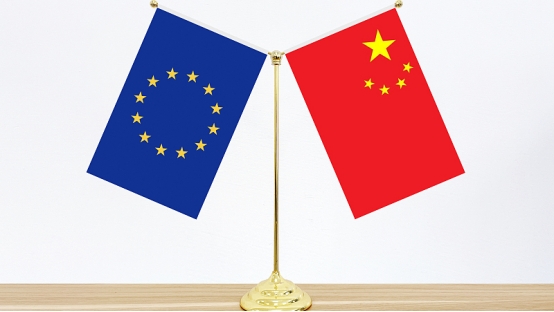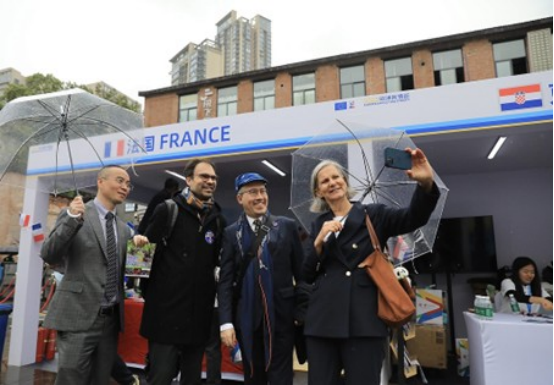FENG Zhongping: An objective assessment of the China-EU relationship needed

The flag of the European Union and the national flag of China. /CFP
Editor's note: Feng Zhongping, a special commentator for CGTN, is currently the Director of the Institute of European Studies at the Chinese Academy of Social Sciences and the Director of the China-CEEC Institute (Budapest). His main research areas include European strategic issues, European integration, China-Europe relations, transatlantic relations, NATO, and China's foreign policy. The article reflects the author's opinions and not necessarily the views of CGTN.
In recent weeks, some European think tanks and commentators have expressed pessimistic views on China-EU relations and the upcoming China-EU Leaders' meeting in Beijing. Ursula von der Leyen, President of the European Commission, has also voiced criticisms, accusing China of overcapacity and using rare earths as economic leverage during her speeches at the G7 Summit in Canada in mid-June and at the European Parliament on July 8.
She attributed all issues and frictions in China-EU economic and trade relations to China. As the summit approaches, the current state and future prospects of China-EU relations have drawn wide attention in both China and Europe.
To assess this relationship properly, a comprehensive and balanced perspective is essential. First, we must adopt a comprehensive and objective perspective on China-EU relations, avoiding one-sided stances. European media and some commentators tend to focus solely on problems, highlighting only the challenges in China-EU relations.
We should instead take a holistic view and not be swayed by European narratives. Overall, while China-EU relations face numerous challenges, there are also areas of cooperation. The fact that European leaders are traveling from Brussels to China to co-chair and participate in the summit demonstrates Europe's willingness to engage in dialogue and cooperation with China.
It is also important to adopt a calm and rational attitude toward this year's leaders' meeting. This year marks the 50th anniversary of formal diplomatic relations between China and the EU, giving people reason to have high expectations for the summit. Since the beginning of the year, Chinese and European leaders have held several phone calls, expressing their commitment to celebrating this milestone and using it as an opportunity to strengthen bilateral cooperation.
At the same time, the global context has undergone a dramatic shift. Since Donald Trump's return to the White House in January, Europe has faced significant pressure in areas such as security and defense, tariffs, and values, leading to serious cracks in the traditional transatlantic alliance.
This shift has raised expectations for closer China-EU ties among some observers. Certain European international affairs commentators have suggested that estrangement between Europe and the U.S. could bring China and Europe closer. However, such views are somewhat oversimplified.
Despite significant differences with the U.S. under Trump's leadership, Europe, for various reasons – especially security concerns – must strive to maintain its alliance with the U.S., even if it means compromising on issues such as tariffs.
We should not expect Europe to align with China to counter the Trump administration. Normally, the China-EU Leaders' meeting is held annually, but it was not held last year due to the European Parliament elections and the transition of EU institutional leadership. In short, we should approach the summit with realistic expectations.

People from China and the EU celebrate the 2025 European Culture Street festival in Chengdu's Dongjiao Memory district, China, April 12, 2025. /CFP
When it comes to existing problems in the relationship, evasion is not a constructive approach, as China and the EU, two of the world's top economies and each other's second-largest trading partners, have significant economic ties. According to Chinese statistics, the total trade in goods between China and the EU reached $785.8 billion in 2024. In terms of investment, EU data indicate that by the first quarter of 2024, China's investment stock in the EU exceeded €140 billion ($163.6 billion), while the EU's investment stock in China reached €177 billion ($206.9 billion). Trade frictions between China and the EU are inevitable. The key lies in how these disputes and conflicts are handled.
The EU has highlighted several prominent concerns, including trade imbalances, industrial overcapacity in China, and the alleged weaponization of critical minerals such as rare earths. Economic and trade cooperation has always been the cornerstone of China-EU relations, with both sides forming a mutually beneficial relationship. Both parties must work together through negotiations to address these issues. Some problems may not be resolved quickly, but both sides can explore solutions together and must avoid escalating or expanding frictions.
Despite persistent disagreements, the mutual need for cooperation between China and the EU remains evident. Strategically, both sides share an interest in resisting unilateralism. Since Trump's return to office, the U.S. has intensified its embrace of unilateralist and hegemonic policies. In this context, China and the EU both see the value of upholding the rules-based international order and preserving multilateral governance mechanisms.
Economically, the relationship remains vital. Although many of Europe's grievances with China stem from the economic and trade domain, this is also where their interests are most aligned. In recent years, while Europe has labeled China as a "competitor" and even a "systemic rival," it has consistently emphasized "de-risking" rather than "decoupling" – a signal that constructive engagement with China remains indispensable.
On global challenges, especially climate change, China and the EU also share a strong basis for cooperation. Although the EU has indicated it will not sign a joint climate action commitment at this year's summit, climate cooperation remains one of the most critical bonds between China and the EU in recent years and moving forward. As a global leader in addressing climate change, Europe has been at the forefront of achieving carbon peak and carbon neutrality goals. Despite the growing competitive and negative aspects of Europe's China policy, climate change response and green transformation remain areas where Europe is most eager to cooperate with China.
Ultimately, both sides must come to terms with a new phase in China-EU relations – one defined by a complex mix of competition and cooperation. As previously noted, both parties remain willing to collaborate in areas such as trade and green transformation. But this cooperation is now accompanied by growing competition. It is essential for both China and the EU to gradually adapt to this evolving dynamic with pragmatism, mutual respect and a long-term vision.
The upcoming leaders' meeting may not solve all problems. Still, it presents a vital opportunity for China and the EU to improve understanding, manage differences and reaffirm their commitment to constructive engagement.
Feng Zhongping, director of Institute of European Studies of the Chinese Academy of Social Sciences.
The article was originally published in CGTN on July 23, 2025. The article has been authorized.
